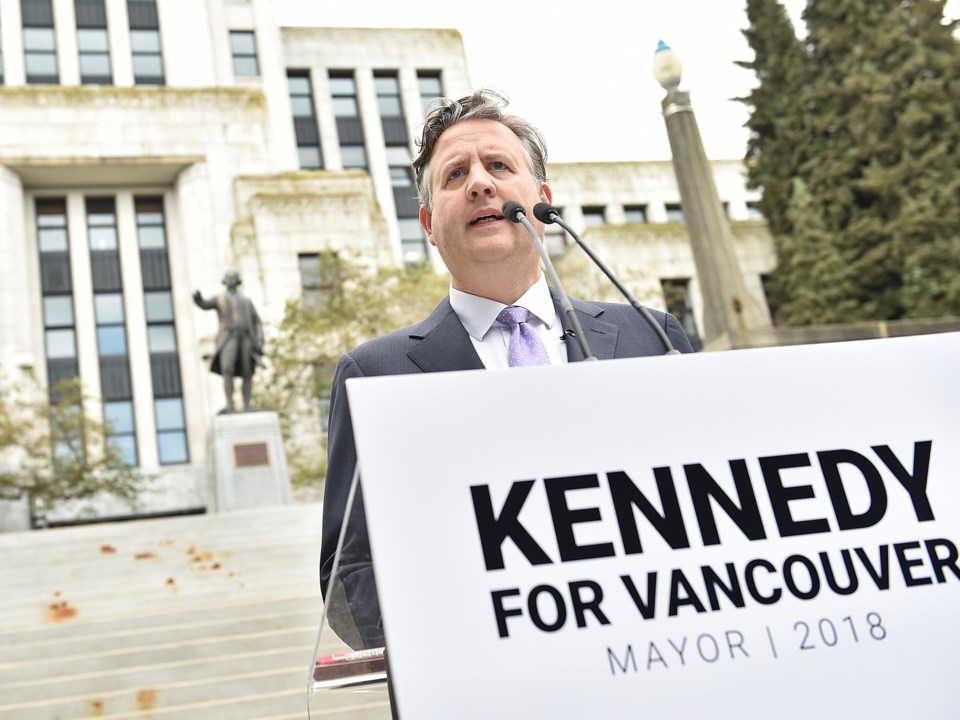An independent candidate for mayor says city hall should have a conflict-of-interest officer and a lobbyist registry to provide the public with more transparency on how elected officials conduct themselves while on the job.
If elected Oct. 20, Kennedy Stewart promised to bring in such measures within 100 days of his first term in office. His aim is to get the real estate industry and other big money interests out of the “backrooms” at city hall.
“It’s no secret real estate speculators have poured money into our politics over the last few decades,” he told reporters Thursday on the back steps of city hall. “For example, of the $6 million raised and spent in the last Vancouver election, two-thirds came from corporations, most representing real estate industry interests.”
Stewart acknowledged the provincial government’s action last fall to ban union and corporate donations from this year’s campaign is good news. But, he said, city government has a role to play in tracking any potential conflicts of the mayor and council, and disclose who is meeting with council members.
The measures would include:
- Require elected officials and their spouses to proactively disclose assets, liabilities and financial interests.
- Prohibit elected officials from “engaging in employment, practising a profession, carrying on a business or holding an office or directorship, if these activities are likely to conflict with their public duties.”
- Prohibit elected officials and city staff from accepting government contracts or lobbying for 12 months after leaving their positions.
- Hire a conflict-of-interest officer, and allow the public to initiate investigations through the officer.
- Require lobbyists to declare details of their activities on an online registry and make this information available to the public. Fines would be levied for non-compliance.
Stewart, who continues to serve as the NDP MP for Burnaby-South, noted federal laws for politicians prohibit him from accepting campaign contributions worth more than $1,550 from individuals. He also said he hasn’t taken a penny from corporations or unions.
“I have not met with lobbyists, unless they are registered in a lobbyist registry,” he said, noting he and his spouse proactively disclose all assets, activities, gifts and sponsored travel “which you can see right now by just typing my name into the federal online registry.”
Stewart tied the need for transparency at city hall to the out-of-control housing market, which he said is ruining Vancouver.
“We need to toughen up our laws to give people confidence that city hall is on their side—we need to regain trust,” said Kennedy, who rents an apartment in the West End. “While real estate speculators make huge profits, housing costs have spiraled out of control. Families are leaving their city and more people are living on the street. It’s no wonder so many people want change.”
Stewart’s call for more transparency is not new, with Vision Vancouver Coun. Andrea Reimer having in recent months pushed the provincial government to tighten the B.C. Financial Disclosure Act, which requires municipal politicians to disclose financial statements.
Reimer successfully moved a motion at council three weeks ago that calls for the Act to be amended to ensure all potential conflicts and financial interests of council members are disclosed.
Currently, as Reimer argued in her motion, the Act doesn’t require disclosure of potential conflicts for council members where the conflicts “may be obscured as a result of them being employed as lobbyists or government and public relations consultants on behalf of other private interests.”
Her motion is now expected to go before the Union of B.C. Municipalities for review.
The Union of B.C. Municipalities and the Lower Mainland Local Government Association have also endorsed a February 2017 motion from Reimer to request the provincial government give municipalities the power to create and enforce rules related to a lobbyist registry.
“We await a response from the province,” she said, noting rules must be in place before thinking about hiring a conflict-of-interest officer. “I would be opposed to spending money on a person that had zero ability to do the job that the public thinks they’re doing.”
Added Reimer: “What people want to see is action. They want to know that when these things happen, they actually mean something. For it to mean something, the provincial government must make the change.”
In the 2014 election campaign, the NPA’s mayoral candidate Kirk LaPointe called for an independent office of the ombudsperson and a lobbyist registry. Edmonton and Toronto have ombudsperson offices, although B.C. has an ombudsperson that has jurisdiction over local governments.
Concerns with how council and staff conduct business at city hall are not new.
In 2009, lawyer Richard Peck outlined a series of recommendations to council that included hiring a so-called integrity commissioner to investigate councillors and employees who contravene the city’s code of conduct.
The city hired Peck in 2008 to investigate the leak of a confidential document related to the Olympic Village project from an Oct. 14, 2008 in camera meeting of council.
Some councillors took polygraph tests conducted by the Vancouver Police Department, which launched an investigation into the missing document but failed to recommend any charges.
Council never did hire an integrity commissioner.
@Howellings



